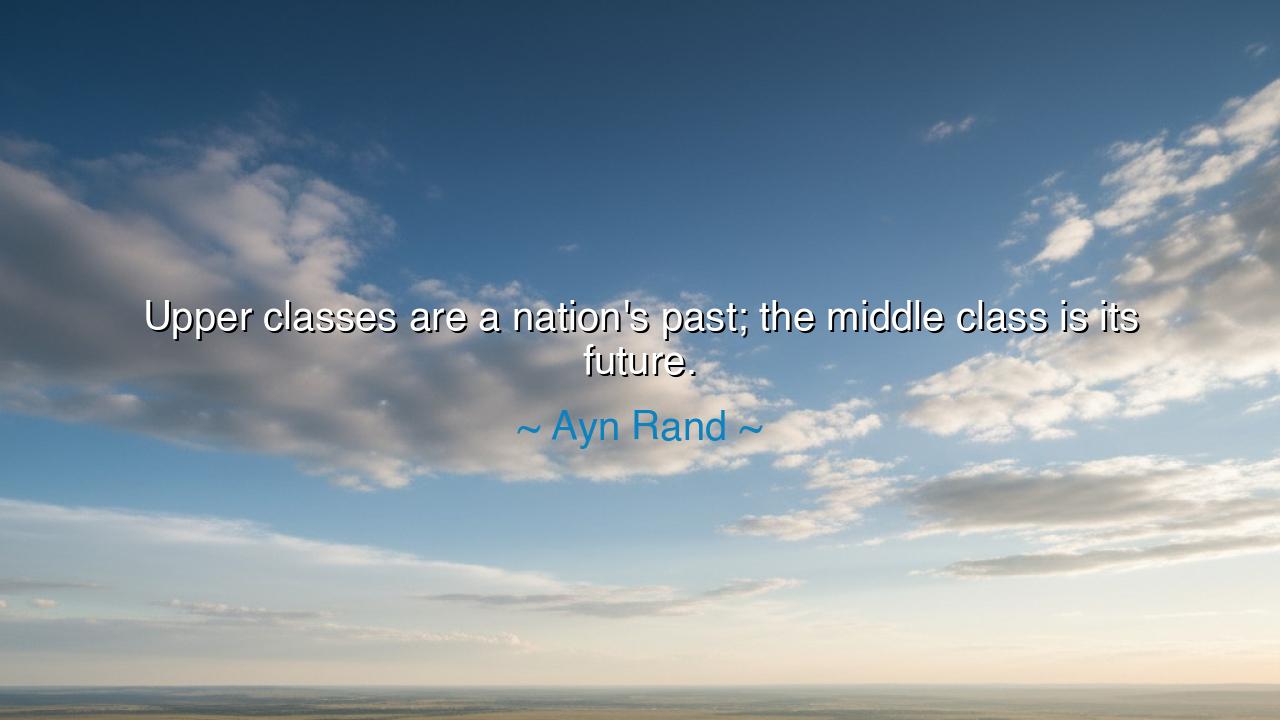
Upper classes are a nation's past; the middle class is its






"Upper classes are a nation's past; the middle class is its future." These words, spoken by the great thinker Ayn Rand, speak to the ever-changing nature of societies, their structure, and their progression. In her philosophical framework, Rand emphasized individualism, self-reliance, and the role of the productive mind in shaping the future. To understand this quote fully is to see the role of the middle class as the engine of innovation, the lifeblood of a nation’s advancement, and the bridge between past traditions and future potentials. The upper classes, with their wealth and traditions, represent the culmination of an era; yet, it is the middle class—the workers, the creators, the innovators—that holds the key to a nation’s future.
In ancient times, it was the aristocracy that held power and wealth. Their way of life, bound by traditions, land ownership, and inherited wealth, was the backbone of many empires. However, as time went on, the ancient world saw the rise of the middle class, those who worked not by birthright but through individual effort. The merchant class, the traders, and the craftsmen of ancient civilizations were often the driving forces behind the creation of wealth, the spread of ideas, and the transformation of societies. Take, for instance, Ancient Greece: while the nobility and aristocrats were the holders of culture and military power, it was the middle class of artisans and philosophers who laid the foundations for the intellectual future of the world. Without them, the achievements of Plato, Aristotle, and Socrates would never have flourished, and the seeds of democracy and individual liberty would not have taken root.
Consider, too, the rise of the Roman Empire. The aristocracy held vast estates, while the middle class of traders and entrepreneurs brought goods and ideas from across the empire’s vast reaches. The middle class was the lifeblood of Rome’s economy. It was their work, their trade, and their civic engagement that propelled Rome into an age of expansion and prosperity. While the elite class enjoyed their privilege, it was the industrious efforts of the middle class that ensured Rome’s growth, power, and influence. This is the essence of Rand’s quote—the upper class may define a nation’s past, but it is the middle class, through their labor, ideas, and inventions, that builds its future.
This historical lesson is evident in the industrial revolution of the 18th and 19th centuries. The upper class may have profited from centuries of tradition and inheritance, but it was the middle class—the engineers, the workers, and the entrepreneurs—that transformed society. They built the factories, designed new technologies, and created industries that revolutionized the world. The middle class became the primary drivers of economic progress and social change. Through their efforts, the world moved from agrarian economies to urbanized, industrialized societies. The future of nations—just as Rand said—rests upon their innovation and enterprise.
Yet, Rand’s words also remind us of an inherent truth: the upper class, while often seen as symbols of tradition, wealth, and power, cannot remain stagnant if a nation is to evolve. They may hold the mantle of the past, but it is the middle class that breathes life into the future. It is in the dreams, aspirations, and work ethic of the middle class that we find the promise of a nation’s future. The middle class is not merely the foundation but the forward motion—the transformative force that moves societies toward progress.
The lesson from Ayn Rand’s quote is clear: the middle class is essential for progress and innovation. To place all faith in the elite classes, who often cling to tradition and the preservation of their status, is to deny the power of change and growth. The middle class, through its work, creativity, and drive, is the lifeblood of a nation’s future. Nations that nurture their middle class, that support education, entrepreneurship, and innovation, will find themselves poised for long-term prosperity and advancement.
Practical Actions:
-
Invest in education: The key to a thriving middle class is knowledge and skill. By supporting education and learning, we ensure that future generations can continue to innovate and contribute to society.
-
Encourage entrepreneurship: Create environments where entrepreneurs can thrive. By supporting new businesses and fostering a culture of innovation, we empower the middle class to lead the charge in economic growth.
-
Value hard work: Recognize and support those whose efforts drive progress. The middle class is built on the sweat of everyday labor and the pursuit of personal excellence.
-
Challenge traditional structures: Understand that the future is built not on preserving the old ways but in embracing change, in rethinking norms, and creating new opportunities for social mobility.
-
Promote fairness: Advocate for policies that give everyone an equal chance to succeed. Empowering the middle class through opportunity, not privilege, creates a society where prosperity is earned and shared.






AAdministratorAdministrator
Welcome, honored guests. Please leave a comment, we will respond soon